John Janaro's Blog, page 17
January 9, 2025
“Impressions of Snow” (January 2025)
From the “Virtual Art Gallery” of JJStudios, we present these visual meditations on the recent (relatively mild) snow as experienced by JJ in his part of the Shenandoah Valley. People north and south of us, or at higher altitudes, may have had a more dramatic and voluminous snow experience in these early days of January 2025.
The first image is entitled “Waiting for Snow,” while the others form a series of “Impressions of Snow” (1, 2, and 3). They have been posted elsewhere, but here we can gather them in one place:




January 7, 2025
He Loved Us and Sent His Son
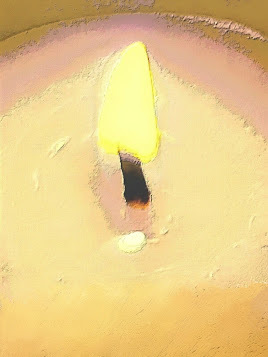 "Let us love one another, because love is of God; everyone who loves is begotten by God and knows God. Whoever is without love does not know God, for God is love. In this way the love of God was revealed to us: God sent his only-begotten Son into the world so that we might have life through him. In this is love: not that we have loved God, but that he loved us and sent his Son as expiation for our sins" (1 John 4:7-10).
"Let us love one another, because love is of God; everyone who loves is begotten by God and knows God. Whoever is without love does not know God, for God is love. In this way the love of God was revealed to us: God sent his only-begotten Son into the world so that we might have life through him. In this is love: not that we have loved God, but that he loved us and sent his Son as expiation for our sins" (1 John 4:7-10).
January 6, 2025
Happy Epiphany, and Happy Epiphany WEEK!
Happy Epiphany WEEK! Beautiful prayers as the liturgical Christmas Season continues until next Sunday. God the Word “appeared among us as the splendor of truth” by sharing “the frailty of our flesh.”⭐️


January 4, 2025
Another “New Year” For Me
Since I was a little boy, I noticed that the celebration of the beginning of each new year has also involved celebrating the beginning of a “new year” in my own life. January 2 is JJ’s own “New Years Day,” and there have been quite a few of these. I have just marked the 23rd anniversary of my 39th birthday!
Ha ha ha…😜
62 years is a good stretch of time. It puts many things into perspective, but I'm not going to philosophize about them today. The most important thing I can say is that I thank God for everything.
We had a lovely day with family and friends. I got a very much needed haircut and beard trim from my favorite barber: my wife. I went for a walk in the cold clear air with Maria and Anna. We will have a bit more of a party over the weekend.
I’ll just post a collection of pictures, some old and some new, that cover various points of time and memory over these 6+ decades.





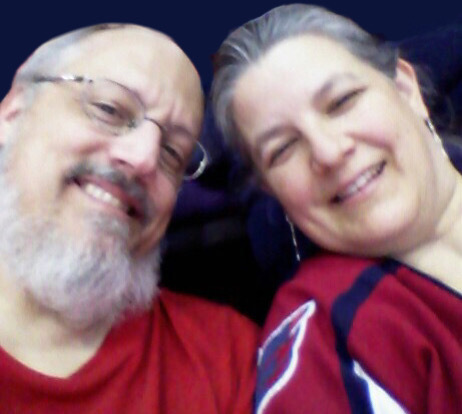














January 1, 2025
World Day of Peace 2025
 New Years Day on the liturgical calendar of the current Roman Rite is not only the Octave of Christmas (Merry Christmas Day Eight!) and the Solemnity of Mary, Mother of God (that singular collaborator in the Mystery of the Nativity of Christ); it has also been designated (since 1968) as the World Day of Peace. Every year since 1968, the Popes have issued “Messages” to the Church and the world for this day, encouraging us to pray and work for true peace—peace in our hearts and peace in the world. Pope Francis gives us a great challenge for this new year, to seek peace under the light of the Prince of Peace, through justice, dialogue, works of mercy, and solidarity (read the entire text here).
New Years Day on the liturgical calendar of the current Roman Rite is not only the Octave of Christmas (Merry Christmas Day Eight!) and the Solemnity of Mary, Mother of God (that singular collaborator in the Mystery of the Nativity of Christ); it has also been designated (since 1968) as the World Day of Peace. Every year since 1968, the Popes have issued “Messages” to the Church and the world for this day, encouraging us to pray and work for true peace—peace in our hearts and peace in the world. Pope Francis gives us a great challenge for this new year, to seek peace under the light of the Prince of Peace, through justice, dialogue, works of mercy, and solidarity (read the entire text here).“May 2025 be a year in which peace flourishes! A true and lasting peace that goes beyond quibbling over the details of agreements and human compromises. May we seek the true peace that is granted by God to hearts disarmed: hearts not set on calculating what is mine and what is yours; hearts that turn selfishness into readiness to reach out to others; hearts that see themselves as indebted to God and thus prepared to forgive the debts that oppress others; hearts that replace anxiety about the future with the hope that every individual can be a resource for the building of a better world” (Pope Francis, “Message” 13).
When Francis, like his predecessors, speaks of “building…a better world,” he is not referring to a vague secularist humanitarianism, but to the work of fraternal charity, the work of hearts that communicate the integral love of the Heart of Jesus for human persons, communities, societies, and nations, the collaboration with Jesus in spreading the first fruits—the “foretaste”—of His Father’s Kingdom wherein we are destined to share His glory, and be definitively fulfilled as His brothers and sisters, and therefore brothers and sisters of one another. The Pope addresses the whole world because he knows that whoever seeks true peace—in justice, mercy, freedom, love, and solidarity—seeks God’s Kingdom whether they are explicitly aware of it or not.
December 31, 2024
The End and the Beginning...
 We have arrived at the end of the year 2024, which—even as I write these words—has already changed to the beginning of 2025 in many parts of the world. Global celebrations with parties, fireworks, and food and drink have long marked the end of December and the beginning of January as a "new year" with a new number to designate it.
We have arrived at the end of the year 2024, which—even as I write these words—has already changed to the beginning of 2025 in many parts of the world. Global celebrations with parties, fireworks, and food and drink have long marked the end of December and the beginning of January as a "new year" with a new number to designate it.From ordinary people to news and entertainment media, it is customary to "look back" on the year that has passed, and remark on its significant moments regarding births and deaths, engagements, marriages, achievements, failures, tragedies, wars and treaties of peace, political elections, regime changes, news of [and gossip about] celebrities or other prominent personalities, the top movies and videos, the top songs in popular music, foods, weather, fads, stock-markets, sports champions, "annual" statistics of every imaginable kind, etc., etc. And, of course, all sorts of “projections” for what might happen in the new year. Then, at midnight, people attending parties and celebrations feel that they have "changed"—that they have now been "clothed" with a new year of possibilities, a chance for a new life (or at least a better life) which prompts them to make "resolutions," most of which are forgotten in a few weeks.
Most of these secular traditions have not varied much since I was a boy in the late-1960s-early-1970s. But there are many differences too. I recall being with parents and grandparents, crowding around a twenty-inch screen on a black-and-white television watching Guy Lombardo and his Orchestra play fancy music while "everyone" at Times Square in New York City, watching on TV, and—basically—the WHOLE WORLD waited for famous "ball" to drop and officially declare the beginning of January 1, 1970 or whatever the new number was.
The year 1970 sticks in my mind from childhood. I was an unusually curious and bright first-grader who learned a few things about "decades" and became fascinated with the idea that "we are entering a new decade!" It felt so expansive, so full of possibilities, this new decade that began in 1970.
That was 55 years ago.
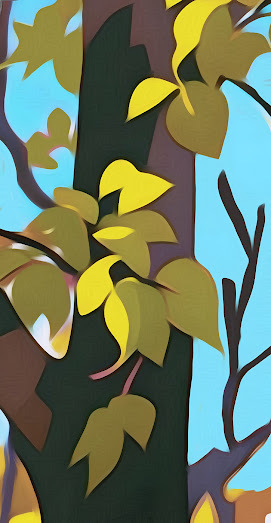 How did we get these day and weeks, months and years? Well, there are of course many different calendars and calendar systems which people still follow in many parts of the world, that belong to their religious and cultural heritage. But the “Global Village” in its interactions and its doing-business (if nothing else) uses a common annual calendar which grew from ancient Roman civilization. The names of the months are Latin-based, indicating gods or numerical points: thus “January” is for “Janus,” who stood as the “gateway” to the new year, while “December” indicated the “tenth” month, which it actually was in the early Roman Republican 10 month calendar (notice that the “numerical months” are all “off” by a deficit of two). At some point in the Roman Republican period, the first two months of January and February were added on at the beginning. It was a solar calendar, so the effort was made to correspond to the solstices and—Rome being in the temperate zone—the patterns of the seasons which were important to agricultural societies. Calendars were fine-tuned, days added, in order to keep aligned with the changes in the relationship between earth and sun.
How did we get these day and weeks, months and years? Well, there are of course many different calendars and calendar systems which people still follow in many parts of the world, that belong to their religious and cultural heritage. But the “Global Village” in its interactions and its doing-business (if nothing else) uses a common annual calendar which grew from ancient Roman civilization. The names of the months are Latin-based, indicating gods or numerical points: thus “January” is for “Janus,” who stood as the “gateway” to the new year, while “December” indicated the “tenth” month, which it actually was in the early Roman Republican 10 month calendar (notice that the “numerical months” are all “off” by a deficit of two). At some point in the Roman Republican period, the first two months of January and February were added on at the beginning. It was a solar calendar, so the effort was made to correspond to the solstices and—Rome being in the temperate zone—the patterns of the seasons which were important to agricultural societies. Calendars were fine-tuned, days added, in order to keep aligned with the changes in the relationship between earth and sun.The Romans were good mathematicians, calculating that what we now refer to as a “trip around the sun” took 365 days and a bit less than six further hours. And it was Julius Caesar (who saw himself as a consolidator of the Roman world) who instituted the “Julian Calendar,” which cleverly established the “leap day” once every four years to make up for the accumulations of extra hours at the end of each year. The Julian Calendar is almost the same as today’s common calendar. A solar year is actually 365.2425 days. It wasn’t unreasonable for the Romans to think that rounding it up to a quarter of a day was “close enough.” They probably never dreamed that the same calendar would still be in use 1500 years later. By then, the Caesarian glitch of putting a little too much “leap” into the quadrennial Leap Year has resulted in the calendar that was 10 days ahead of the actual annual trip around the sun.
So the math experts came up with a better arrangement for the future by skipping certain leap years (math nerds can look up the details) to bring the recorded year closer to solar year. This was also important for the Church’s calculation of movable feasts, above all Easter, which was always celebrated on the first Sunday after the first full moon on or after the spring equinox, which was designated for March 21. In 1582, another Roman—Pope Gregory XIII—established the official new calendar by instituting the changes and by subtracting ten days from the month of October of 1582 (just for that year, to put the calendar back “in sync”—thus October 4, 1582 was followed the next day by October 15, 1582). Catholic countries switched first, but eventually all Western countries adopted this as the common calendar.
 Then, in the 19th century, the West spread its civil and economic institutions by way of its colonial system all over the face of the earth. They proceeded in the 20th century to fight a horrible war against one another, then another horrible war with more countries, from which emerged a global standoff that almost literally set the entire world on fire. But people also discovered amazing medical interventions, technologies of all kinds, water purification, indoor flush toilets, electricity, radio, television, computers, the internet. We also learned from some of our most destructive mistakes (while at the same time inventing new mistakes). The past century-and-a-quarter has been quite a ride. The 20th century in which I was born is loaded with years that are associated with historical events and changes of gigantic significance: 1914, 1917, 1939, 1945, 1948, 1949, 1956, 1968 (oh boy, 1968), 1989 … and it has continued into the 21st century with 2001 [as in September 11], and—alas, I fear the future may regard it as such—2022 (the beginning of a War that is now being fought in Ukraine but may yet flare up [or pause for a “peace deal,” smolder for a few years, and then explode] all over the Global Village in ways we can hardly imagine).
Then, in the 19th century, the West spread its civil and economic institutions by way of its colonial system all over the face of the earth. They proceeded in the 20th century to fight a horrible war against one another, then another horrible war with more countries, from which emerged a global standoff that almost literally set the entire world on fire. But people also discovered amazing medical interventions, technologies of all kinds, water purification, indoor flush toilets, electricity, radio, television, computers, the internet. We also learned from some of our most destructive mistakes (while at the same time inventing new mistakes). The past century-and-a-quarter has been quite a ride. The 20th century in which I was born is loaded with years that are associated with historical events and changes of gigantic significance: 1914, 1917, 1939, 1945, 1948, 1949, 1956, 1968 (oh boy, 1968), 1989 … and it has continued into the 21st century with 2001 [as in September 11], and—alas, I fear the future may regard it as such—2022 (the beginning of a War that is now being fought in Ukraine but may yet flare up [or pause for a “peace deal,” smolder for a few years, and then explode] all over the Global Village in ways we can hardly imagine).For billions of people, this is not their “primary” calendar and it does not mark today as the eve of the New Year. The Islamic World has a different calendar (though they also use the common calendar for secular and globally interactive purposes). The Chinese “officially” use the Western calendar, but the ancient popular Chinese lunar calendar with its Chinese zodiac is still a strong cultural reference point for a billion and a half Chinese. Calendars are fascinating. Still, in the big transportation-communications-hypernetworked world—the world where people travel and buy and sell and trade, or wish they could—tonight is New Years Eve 2024.
In the 21st century, "New Years Eve" has become (if one wants it to be) an day-long, live-streaming virtual event, where one can "pop in" on many of the large outdoor gatherings in famous cities all over the world and watch countdowns-to-midnight, celebrations, and huge fireworks displays as it “becomes 2025” as much as 16 hours earlier than in New York City, U.S.A. At 8:00 AM this morning, Sydney, Australia was ringing in 2025 with its world-renowned fireworks over the bay. Soon come Tokyo, Taipei, Hong Kong, Mumbai, the Gulf States, Europe with Rome and Paris, then London (where suburban Greenwich still hosts the world’s “official” 0:00 hours clock that sets the standard for the rest of the world). As I write in this moment, 2025 is passing over the Atlantic, so there’s been a bit of a lull on human celebrations, but Brazil is on the horizon: 8 minutes to 2025 for Rio and Sao Paolo.
It is (or will be) 2025 in all those places by the time New York drops the ball in Times Square.
So why do I ramble about all this? The calendar and the years that pass are meaningful for history, for the past, present, and future. They mark the steps of a journey that the whole world now consciously takes at least in a material sense. But why these numbers of this “Roman” Western calendar? The original Roman Calendar (Caesar’s calendar) had “Year One” set at the foundation of Rome 700 years prior to Caesar. Other calendars have other “origin dates.” It’s interesting that what is called the “Common Era” (C.E.) has the number 2025 for the new year. Also, this is the only calendar that counts from the center of time rather than a fundamental beginning. Before the Year One “C.E.” the numbers go backwards: One B.C.E. (Before Common Era), the year before is 2 B.C.E., 3 B.C.E.
When I was young everyone was still using A.D. and B.C (“Anno Domini” and “Before Christ” or the equivalent phrase and, if necessary, initials), whereas now these have fallen out of secular usage. Of course, Christians have long considered by historical indicators that Jesus was probably born around 4 B.C. and that December 25 is a liturgical date rather than a verifiable birthday. Still, the symbolic reference of the number remains the birth of Jesus Christ. Whatever we call it, for whatever reason, whenever we say “Happy New Year” we are acknowledging (even if only remotely and implicitly) that the very measuring of time within history is marked according to the central event that gives meaning to the whole of history: God coming among us in the flesh, entering our history, dwelling with us.
After nearly 62 years of this life, I continue to see more and more why the years are aptly marked in this way. It still matters. It always matters.
Merry Christmas Octave! And Happy New Year…

December 29, 2024
The “Holy Family” and the Christmas Octave
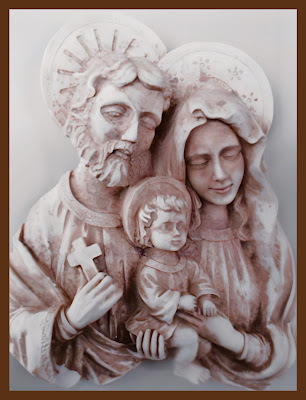 Happy Feast of the Holy Family! Today is the "Fifth Day of Christmas" within the Christmas Octave. Like Easter, "Christmas Day" is eight days long, a celebration that brings each year to an end and begins the next.
Happy Feast of the Holy Family! Today is the "Fifth Day of Christmas" within the Christmas Octave. Like Easter, "Christmas Day" is eight days long, a celebration that brings each year to an end and begins the next. We continue to rejoice in the Birth of Jesus during these days and beyond. The glory of God's infinite merciful love is made manifest in the birth of this Child, the Word made flesh who has come to redeem and transform us.
May the light of Christmas continue to shine in our hearts and sustain us in whatever circumstances we face.
December 26, 2024
Merry Christmas 2024!
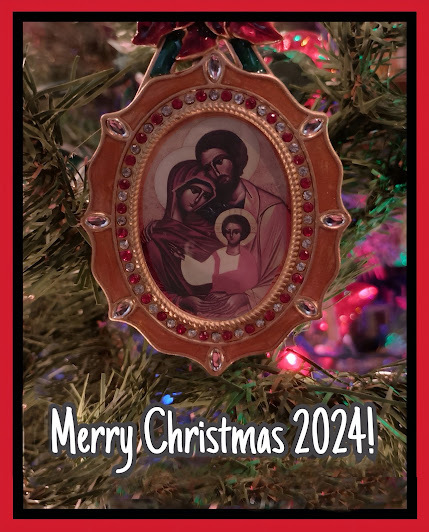 We don’t have any “whole family” pictures this Christmas, although we have all been able spend time together during the past two days. The “Christmas Season” has just begun for us, in any case. It’s nice to have “little kids” around again for the holidays. Maria has had lots of fun with presents this year, and food too. Anna is still at that age where she has more fun playing with the wrapping paper than with presents.😉
We don’t have any “whole family” pictures this Christmas, although we have all been able spend time together during the past two days. The “Christmas Season” has just begun for us, in any case. It’s nice to have “little kids” around again for the holidays. Maria has had lots of fun with presents this year, and food too. Anna is still at that age where she has more fun playing with the wrapping paper than with presents.😉





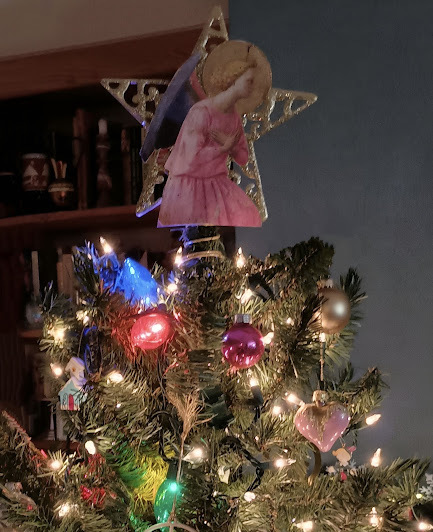
Christ is Born! These are precious days in the liturgical year—days that are “always new” because the manifestation of the glory of God’s love in the Child Jesus is an inexhaustible event. God has drawn close to us, irrevocably. He informs all of our colorful, earthy (even kitsch-y) Christmas traditions of color and lights, cookies and sweets, presents and “good cheer” (which endeavors to visit us a little even in the midst of burdens and suffering); He brings His goodness into the smallness of our human ways.
The “Baby Jesus” statue under our tree is the same one as our kids used to hold for pictures when they were little. It has endured (with only one major repair job) through the years of our family history.
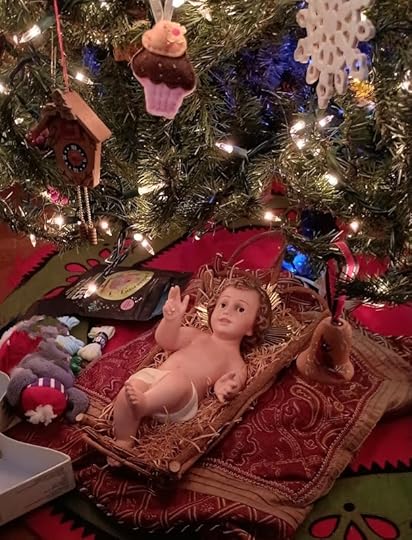
December 25, 2024
Christmas: “Our Destiny Has Made Itself a Presence”
 Christ is born. He is here. He has come to be our companion.
Christ is born. He is here. He has come to be our companion.The CL Christmas Poster for 2024 is powerful. The quotation from Calvino, representing the search and struggle of an ardent religious sense, is followed by Luigi Guissani’s witness the transforming power of God’s saving love made present in Jesus Christ. The video linked below gives the text accompanied by a videographic exploration of the angles, light, and texture of one of William Congdon’s paintings of the Nativity. The English translation of Guissani’s text is voiced over by a recording of the inimitable voice of the great Servant of God who founded the Communion and Liberation movement.
I remember this voice well, and the priest who spoke so convincingly, when he was still healthy and vigorous, giving conferences to hundreds of young people, inspiring them to follow Christ. Inspiring me when I was young, and inspiring me today.
“This has happened! Dispelling the fog of habit from our eyes and hearts, we want to return to the great news, the great announcement, the great fact, the great event… Destiny, our Destiny, has made itself a Presence. But a Presence as a father, mother, brother, friend, and—while we were walking—an unexpected companion along the way. A traveling companion: Emmanuel, God with us! This has happened!” (Luigi Giussani)
December 24, 2024
At Christmas, Ukraine Struggles Against "A Modern Herod"
On Christmas Eve, it’s hard to forget the vast places of the world dominated by violent conflict, or devastated by destructive forces. Once again, Bethlehem—the historic birthplace of Jesus—is threatened by the ongoing war in Israel and Palestine, and the instability of the surrounding countries in the Middle East. There will be few international pilgrims in Bethlehem this Christmas, but Palestinian Christians (yes, they exist) are turning out in force, to worship the newborn King and to pray for Gaza and for an end to the horrible assault that continues rain down chaos and destruction on its impoverished civilian residents, including children. They also marched in a silent procession for peace.
Palestinian Christians are celebrating the birth of the Prince of Peace, and praying that He might grant peace to His homeland, where extremism burns like fire in the minds and actions of people on “all sides” of this relentless conflict:

——————————————————
Then there is another monstrous war that will spend its third Christmas bringing bombs, blackouts, and destruction down upon the lives of innocent civilians: Putinist Russia’s aggression against Ukraine and the Ukrainian people. Some people are placing their hopes on Donald Trump’s “peace plan,” which we know little about except for the self-propagated bravado that always accompanies this man’s idiosyncratic proposals. Who knows? Maybe something genuinely constructive will come of it. I hope so, but I don’t have much confidence at this time. Still, wars are unpredictable. Where will it all lead?
The source I trust most in Ukraine these days is the Office of the Ukrainian “Greek” (Byzantine) CATHOLIC Church. As I have said before, their existence as a Byzantine Catholic Church “sui iurus” but also in full communion with the Roman Church and the Successor of Saint Peter is fully accepted by an independent Ukrainian government that recognizes religious freedom. Russia tolerates Latin rite Catholics and even Latin rite bishops in communion with Rome. But for centuries, Byzantine Christians have been subject to the Orthodox Patriarch of Moscow and the temporal “Caesar” who claimed the imperial succession after the fall of Constantinople, and rebranded his “Muscovite Duchy” as The Third Rome. Imperial expansion was an entitlement, or even a necessity. The Soviet era changed these claims, but they never totally shook off the “Czar” mentality. The Soviet Union had its own Caesars: Khrushchev, Brezhnev, and—of course—Stalin the Terrible. The current Emperor Vladimir shows no signs of being more trustworthy than the Red Emperors who preceded him.
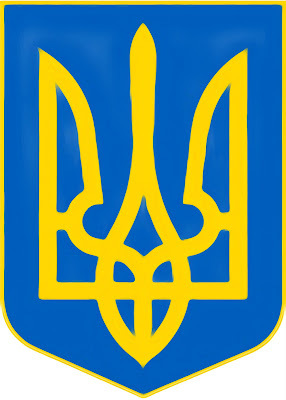 Dialogue, as Pope Francis reminds us, is necessary. This Russian invasion is an abomination, and must be stopped. It is literally destroying Ukraine. It is also slowly but inexorably pulling down the Russia that Putin himself invented. I have no idea how this dialogue might be carried out honestly and fairly, but many things may yet happen that will surprise us. I pray for a real dialogue, which means I’m praying for a miracle. I’m praying for lots of miracles all over the world, but I do so with hope.
Dialogue, as Pope Francis reminds us, is necessary. This Russian invasion is an abomination, and must be stopped. It is literally destroying Ukraine. It is also slowly but inexorably pulling down the Russia that Putin himself invented. I have no idea how this dialogue might be carried out honestly and fairly, but many things may yet happen that will surprise us. I pray for a real dialogue, which means I’m praying for a miracle. I’m praying for lots of miracles all over the world, but I do so with hope.But we also must listen to the Ukrainians, who know well enough what is at stake for them here and now. I think the “Christmas Pastoral Letter” of the Byzantine Catholic “Major” Metropolitan Archbishop of Kyiv Sviatoslav Shevchuk. As head of the Ukrainian Byzantine Catholic Church (he is basically “Patriarch” but without the official title), Sviatoslav has been a courageous Shepherd to his own people and an inspiration to all Ukrainians in the struggle of these times. He expresses with keen insight the recognition of the newness of Jesus Christ as a light that penetrates the deepest darkness. Christ is with us, and is always more powerful than any problems that confront us. And in the face of a war that Sviatoslav Shevchuk clearly understands, the Ukrainian Catholic Primate rejoices in the renewal of faith, Christian love, and mercy that he sees among his people.
I present this pastoral letter below (blue type) in English translation. It is informative, inspiring, and definitely worth reading:
CHRISTMAS PASTORAL LETTER OF HIS BEATITUDE SVIATOSLAV
Most Reverend Archbishops and Metropolitans, God-loving Bishops, Very Reverend Clergy, Venerable Monastics, Dearly Beloved Brothers and Sisters, in Ukraine and throughout the world
"…And she gave birth to her firstborn son and wrapped him in swaddling cloths and laid him in a manger, because there was no place for them in the inn" (Luke 2:7).
Christ is born! Glorify Him!
Beloved in Christ!
The Nativity of Christ envelops us with the invincible power of light and the warmth of God’s love! Today, the Son of God is born in a human body, taking on all the experiences of human life: facing poverty, rejection and enmity, the coldness of broken human relationships, and the darkness of human hatred and persecution. God comes exactly where "there is no place for Him," where man has thrown Him out of his life space and the horizon of his own dreams.
On Christmas night, the spiritual darkness created by man through the coldness of his own indifference and sin dissipates before God’s light from heaven in the Child Jesus, resting in a manger on hay. Under the angelic chant, "Glory to God in the highest and on earth peace…" the coldness of man’s alienation from God and his neighbour transforms into warmth by God’s drawing close to man. This is prophesied by the Old Testament prophet Isaiah: "The people who walked in darkness have seen a great light; those who dwelt in a land of deep darkness, on them has light shined" (Isaiah 9:1).
At the same time, God drawing close to man in the Nativity of the Son of God gives rise to an authentic rapprochement of man with man, to authentic reconciliation and peace that comes to us from heaven. In response to God’s closeness, which warms and saves life, the shepherds say to each other: "Let us go to Bethlehem!" (cf. Luke 2:15). They go together, seek out and find Joseph and Mary with the Child lying in the manger. Having seen the Child in the stable cave, as they were foretold, they go out and joyfully tell about the wonder they experienced.
The description of this meeting breathes warmth on us. The Divine Child is for us, Ukrainians, the light of God amidst the darkness of war, the warmth of God’s closeness amidst the inhuman alienations of today.
In Ukraine this winter, the enemy wants to turn darkness and cold into weapons of mass destruction, the cheapest in the world! Every night, air attacks of the aggressor methodically destroy our cities and villages, homes and their vital infrastructure, kill civilians. The enemy seeks to turn a flourishing country into an icy desert, exporting to Ukraine the wasteland of its own Siberia. What he cannot steal, he recklessly destroys; those he is unable to enslave, he kills. Wherever he goes, there is no room for anyone—neither God nor man. How much effort he puts into sowing cold, hunger, darkness, and his own spiritual emptiness! One can boldly say this about him with the words of the prophet David: "Have they no knowledge, all the evildoers who eat up my people as they eat bread and do not call upon the LORD? There they are in great terror, for God is with the generation of the righteous. You would shame the plans of the poor, but the LORD is his refuge" (Psalm 14:4–6).
But despite the uncertainty, anxiety, mourning, and grief, we Ukrainians celebrate Christmas, as our ancestors did from generation to generation, even when we were under the rule of the godless communist regime of the last century. In the hiding places of the Carpathian forests, in exile or secretly in their homes, they lit a Christmas candle as a sign of living faith, as a sign of the presence of Christ the Saviour among us. When darkness surrounds us, the light, which is the newborn Lord, shines even brighter! He himself assures us of this: "I am the light of the world. Whoever follows me will not walk in darkness, but will have the light of life" (John 8:12). And then he makes each of us bearers of God’s light: "You are the light of the world… In the same way, let your light shine before others, so that they may see your good works and give glory to your Father who is in heaven" (Matthew 5:14.16).
The light of the Newborn in the soul and body of our people illuminates a place of hope and invincibility. As darkness surrounds us, may the light of Christmas that is within us become even brighter! Instead of worrying about the darkness, let us light at least one Christmas candle! When we feel cold, let us warm at least one person with the kindness of our own heart, and together we will experience the warmth of God’s love! Let us spread this Christmas light and warmth around us today.
In the middle of the night of prolonged Russian aggression, we, Ukrainians, light up the invincible light of God’s truth and love with our witness. Examples of this light are the self-sacrificing service of our defenders, the self-sacrificing work of volunteers, doctors and chaplains, the numerous expressions of solidarity that we show to our neighbours in need in the daily circumstances of this calamity of war. And a particular sign of the presence of God’s light in our midst are the Centres for Resilience and the treatment of the wounds of war, which were built by the efforts of our faithful and in which the most vulnerable social groups of our society find spiritual and humanitarian support. These centres, which are usually located near our communities, resemble the quiet place near Bethlehem, which St. Joseph found for Mary and in which she gave birth and swaddled the Child Jesus.
In these contemporary Christmas mangers, where thanks to the glow of human solidarity during the blackouts there is electricity and you can warm up, today carols resound! There a place is provided for God, there a place is provided for every person who can not only satisfy his temporary needs but can also renew the lamp of his own heart, in order to shine unto others "with the hope to which the Lord calls us" (cf. Ephesians 1:18), to be a bearer of resilience for the tired.
Today the heart of every believing Ukrainian becomes a hospitable Bethlehem, where Jesus finds refuge, who comes to us in the form of our neighbour in need. It is in the hearts of the sons and daughters of our people who in their native lands or in the settlements, raise their hands in prayer to the sky and extend a helping hand to their neighbour. It is here that the common victory of Ukraine over a modern Herod, who set out to destroy our people, is forged. And so, with faith in our hearts, we can sing a song of victory over the Herods of all times:
Bless us, Divine Child,
Give us today your gift of love
May not the power of hell ever be able
To separate us from You.
Bless us, for we are Your children,
Christ is born, give praise!
(«Na nebi zirka — In the sky a star»).
On this joyful and bright day of Christmas, I greet each of you with the warmth of God’s unceasing presence. With deep gratitude in my heart, I greet our military, volunteers, doctors, energy workers, and rescuers. For several years now, you have been the bearers of hope, tirelessly protecting, supporting, and preserving the lives of our long-suffering people.
I also greet our teachers and educators, who with great dedication in conditions of war not only impart knowledge to children, but also nurture in them a sense of resilience, teach them to be human, even in inhumane circumstances. To everyone who shines with a bright heart in the midst of darkness and projects the warm of kindness in the cold of war and devastation, I express my deep gratitude.
I greet those who are currently on the front line, in the occupied territories, in hospitals. I especially greet those who lost their homes, and those who provided shelter to those in need, whether in Ukraine or abroad, so that they might experience some home comfort and Christmas joy.
With Christ’s Nativity I wish to hasten to those who mourn the loss of the dead and the missing in action, who watch over the wounded in hospitals.
I embrace those who are far from their homeland, parents who miss their children, wives who are waiting for their husbands to return from the front, and children who are praying that daddy will come home as soon as possible.
From the bottom of my heart, I impart on you all my fatherly blessing, and wish each of you, from the youngest to the oldest, the true joy of God’s children, a tasty kutia, a merry celebration of Christ’s Nativity, and a happy, peaceful, victorious and blessed New Year. As long as we are able to shine and warm one another with the light of Christmas, carols and prayer, no darkness or cold will ever overcome us!
Christ is born! Glorify Him!
† SVIATOSLAV
Given in Kyiv at the Patriarchal Cathedral of the Resurrection of Christ, on the day of our father, St. Nicholas of Myra in Lycia, the Wonderworker, the 6th of December in the 2024th Year of our Lord.



